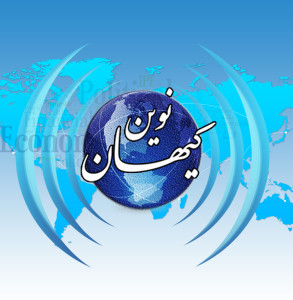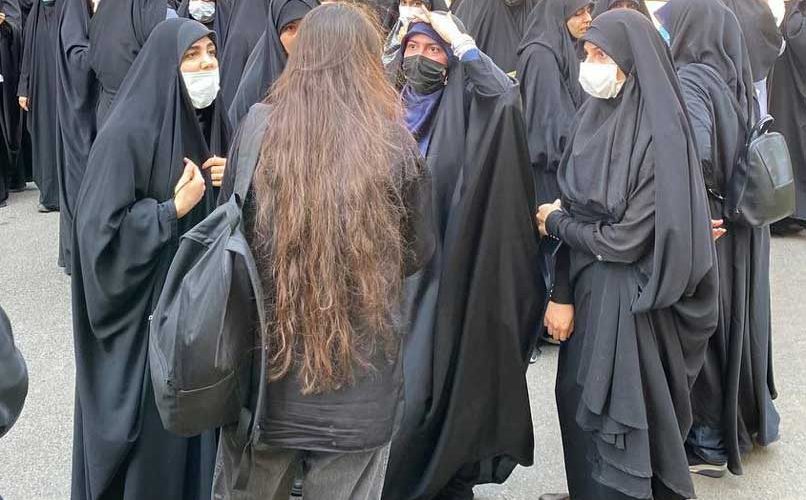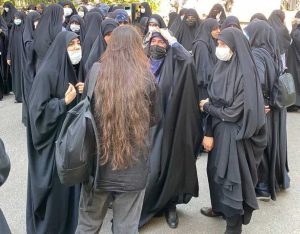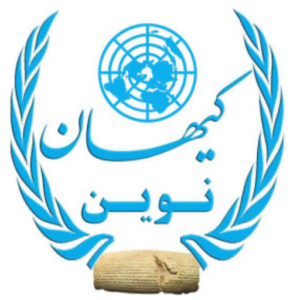اسماعیل صدیق رئیس اتحادیه پوشاک کرج با اعلام اینکه برخی از بانوان فروشنده، پوشش مناسبی در محل کسب و کار خود ندارند گفت: «این موضوع منجر به نارضایتی مسئولان استان شده است لذا به مدیرانِ مجتمعهای تجاری تذکر دادیم که اگر مشکل بیحجابی توسط اصناف حل نشود، واحد صنفی را پلمپ میکنیم.»
Ismail Sediq, head of the Karaj Clothing Union, announced that some saleswomen do not have proper clothing at their place of business and said: “This issue has led to the displeasure of the provincial officials, so we have warned the managers of commercial complexes that if the problem of not wearing veils is not solved by the guilds We will seal the union.”
کیهان نوین: رئیس اتحادیه پوشاک کرج با اعلام اینکه برخی از بانوان فروشنده، پوشش مناسبی در محل کسب و کار خود ندارند گفت: «در بین قوانین صنفی، رعایت شئونات اسلامی نیز ذکر شده و کسبه با توجه به تعهداتی که دارند باید حجاب خود را رعایت کنند.»
پیشتر در ۲۰دیماه عبدالصمد خرمآبادی معاون دادستان کل در امور نظارت بر دادسراها و ضابطین سراسر کشور در یادداشتی از دستور دادستانی کل کشور به پلیس سراسر کشور خبرداد که قرار است «با قاطعیت با «کشف حجاب» برخورد کنند.»
وی با اشاره به اینکه بعد از ناآرامیهای اخیر، تعدادی از بانوان فروشنده، پوشش مناسبی در محل کسب و کار خود ندارند، افزود: در بین قوانین صنفی، رعایت شئونات اسلامی نیز ذکر شده و کسبه با توجه به تعهداتی که دارند باید حجاب خود را رعایت کنند.
در پنجم دیماه نیز خبرگزاری دانشجویان ایران(ایسنا) از پلمپ دو واحد صنفی در مجتمع دیپلمات سنتر شهرستان بروجرد به دلیل «عدم رعایت مقررات اجتماعی و کشف حجاب فروشندگان در محیط مجتمع» از سوی دادستان و اداره نظارت بر اماکن عمومی نیروی انتظامی این شهرستان خبر داد.
در همین ارتباط محمد مقیمی رئیس دانشگاه تهران در ۲۹ دیماه از مصوبه جدید شورای فرهنگی دانشگاه تهران درباره برخورد با بیحجابی در این دانشگاه خبر داد و گفت: «بر اساس این بخشنامه که از امروز لازمالاجراست، در مرحله اول افراد بیحجاب در بدو ورود و در داخل محیط دانشگاه از طریق کارت دانشجویی شناسایی خواهند شد. به این افراد در این مرحله تذکر داده میشود تا به رعایت قانون برگردند و صرف نظر از هر اعتقاد و دیدگاهی که دارند، قانون را فصلالخطاب قرار دهند و به مقررات پوشش تمکین نمایند. در این مرحله نیروهای انتظامات بعد از شناسایی افراد، صرفا به تذکر قانونی برای رعایت حجاب بسنده خواهند کرد و حتی در قبال افرادی که به تذکر بیتوجهی میکنند، اجازه ورود میدهند و برخوردی با آنها نخواهند کرد، اما مشخصات اینگونه افراد را ثبت نموده و آن را به مراجع ذیصلاح گزارش خواهند داد. »
اعضای شورای عالی انقلاب فرهنگی نیز در ۱۸ دیماه با صدور بیانیهای پیرامون حجاب و عفاف تاکید کردند: «مواجهه با آنچه در جامعه ما «بیحجابی» نامیده میشود باید کاملاً هوشمندانه و واقعبینانه باشد. چنانکه رهبر معظم انقلاب اسلامی هشدار دادند ضعف حجاب بعضی از بانوان را نباید به معنای بیاعتقادی آنان به مبانی دینی و مخالفت آنان با انقلاب و جمهوری اسلامی دانست و علاوه بر این باید علاوه بر چادر که حجاب سنتی و فراگیر زنان مسلمان ایران است، انواع دیگر حجاب را، که نمونههایی از آن در دیگر کشورهای اسلامی نیز مشاهده میشود در چارچوب حکم شرعی حجاب محترم و مجاز دانست.»
ازسوی دیگر روز ۲۰دیماه عبدالصمد خرمآبادی معاون دادستان کل در امور نظارت بر دادسراها و ضابطین سراسر کشور در یادداشتی از دستور دادستانی کل کشور به پلیس سراسر کشور خبرداد که قرار است «با قاطعیت با «کشف حجاب» برخورد کنند.»
وی در بخشی از این یادداشت گفته است: «دادگاهها میتوانند کسانی را که مرتکب جرم کشف حجاب میشوند علاوه بر پرداخت جزای نقدی به تحمل یک یا چند مورد از مجازاتهای تبعی و تکمیلی مانند تبعید، منع از اشتغال به حرفه یا کار معین، انفصال از خدمات دولتی و عمومی، منع از خروج از کشور، الزام به انجام خدمات عمومی رایگان، منع از عضویت در احزاب، گروهها و دستجات سیاسی یا اجتماعی، توقیف وسایل دخیل در ارتکاب جرم (مانند بستن محل کسب و توقیف وسیله نقلیه، توقیف رسانه)، الزام به یادگیری حرفه، شغل یا کار معین و… به مدت شش ماه محکوم کند.»
به گفته خرمآبادی، مجازات جرم تشویق و ترغیب دیگران به کشف حجاب بسیار سنگینتر از جرم کشف حجاب است، چرا که تشویق و ترغیب به کشف حجاب یکی از مصادیق بارز تشویق به فساد محسوب میشود و مجازات تشویق به فساد به موجب بند (ب) ماده ۶۳۹ قانون مجازات اسلامی یک تا ده سال حبس است بنابراین دادگاهها مکلفند کسانی را به هر طریق دیگران را ترغیب به کشف حجاب مینمایند به مجازات فوق الذکر محکوم کنند.
حسین طائب رئیس سابق سازمان اطلاعات سپاه (ساس) نیز روز۱۴ دی ماه در جمع تعدادی از دانشجویان دانشگاه صنعتی اراک اعلام کرد: «در بحث گشت ارشاد باید اول این مسئله را بررسی کنیم که حجاب معروف است یا منکر؟ اگر معروف و منکر هست آیا بحث امر به معروف و نهی از منکر جزو دین اسلام هست یا نه؟ فلسفه جمهوری اسلامی این است که احکام خدا در جامعه پیاده شود و اگر اصل حجاب را کنار بگذاریم، درواقع فلسفه جمهوری اسلامی را گنار گذاشتهایم. در همه جای دنیا اجرای قانون را به پلیس میسپارند. دقت کنید که پلیس یک مجموعه نظامی نیست بلکه انتظامی است. اگر پلیس را برای امر حجاب نگذاریم پس چه ارگانی را بگذاریم؟»
در هفته دوم آذرماه خبرهایی درباره تعطیلی فعالیت گشت ارشاد در ایران منتشر شد. دادستان کل کشور هم این خبر را تأیید و البته تأکید کرده بود که قوه قضاییه نظارتهای خود را بر «کنشهای رفتاری در سطح جامعه» ادامه خواهد داد.
این سخنان موجی از اظهارات متناقض در پی داشت. علی خانمحمدی سخنگوی ستاد امر به معروف و نهی از منکر در مصاحبهای با وبسایت جماران گفته بود که ماموریت گشتهای ارشاد به پایان رسیده ولی جایگزینهایی باید برای آن در نظر گرفته شود.
سخنگوی ستاد امر به معروف و نهی از منکر همچنین ابراز امیدواری کرده بود که فعالیت گشت ارشاد «در یک چهارچوب نوینتر، با استفاده از تکنولوژیهایی که در این زمینه هست و با فضایی که یکطرفه نباشد، انجام شود.»
پیش از آغاز خیزش ملّی اخیر و در اوایل شهریورماه نیز محمدصالح هاشمیگلپایگانی دبیر ستاد امر به معروف و نهی از منکر نیز از استفاده از دوربینهای تشخیص چهره و هویت برای مقابله با «بدحجابی» خبر داده بود: «اگر شخصی در معابر عمومی مثل مترو رعایت حجاب نکند؛ دوربین مترو از او عکس میگیرد و یک مبلغ اثرگذار جریمه میشود.»
New Universe:
The head of the Karaj clothing union announced that some saleswomen do not have proper clothing at their place of business and said: “Among the trade union rules, the observance of Islamic customs is also mentioned, and the businessmen must observe their hijab according to their obligations.” »
– Earlier on December 20th, Abdul Samad Khorramabadi, the Deputy Attorney General for the supervision of prosecutors and police officers across the country, informed the police of the entire country in a memo of the order of the Attorney General’s Office that they are going to “resolutely deal with the discovery of the hijab.”
Pointing out that after the recent unrest, a number of saleswomen do not have proper veils at their place of business, he added: among the trade union laws, the observance of Islamic customs is also mentioned, and according to their obligations, the shopkeepers must wear their hijab. comply
On the 5th of January, the Iranian Student News Agency (ISNA) reported that two trade unions in the Diplomat Center complex of Borujerd city were sealed due to “non-compliance with social regulations and the discovery of hijab sellers in the area of the complex” by the prosecutor and the Public Places Supervision Department of the police force of this city. gave
In this connection, Mohammad Moghimi, the President of Tehran University, announced on January 29th the new resolution of the Cultural Council of Tehran University regarding the treatment of veiling in this university and said: “According to this circular, which is effective from today, in the first stage, veiled persons upon arrival and in They will be identified inside the university through the student card. At this stage, these people are reminded to return to complying with the law and regardless of their beliefs and views, make the law a chapter of discourse and obey the rules of clothing. At this stage, after identifying the people, the security forces will only be satisfied with a legal notice to observe the hijab, and even for those who ignore the notice, they will allow them to enter and will not deal with them, but they will record the details of such people and that will report to the competent authorities. »
The members of the Supreme Council of the Cultural Revolution also issued a statement on hijab and chastity on January 18 and stressed: “The confrontation with what is called “no hijab” in our society must be completely intelligent and realistic. As the Supreme Leader of the Islamic Revolution warned, the weakness of some women’s hijab should not be taken as a sign of their disbelief in religious principles and their opposition to the revolution and the Islamic Republic, and in addition to the chador, which is the traditional and comprehensive hijab of Iranian Muslim women, other types should be used. Hijab, examples of which can be seen in other Islamic countries, is respected and permitted within the framework of the Sharia ruling.
On the other hand, on December 20th, Abdul Samad Khorramabadi, the Deputy Attorney General for the supervision of prosecutors and police officers across the country, informed the police of the entire country in a memo of the order of the Attorney General’s Office that they are going to “resolutely deal with the discovery of the hijab.”
He said in a part of this note: “Courts can make those who commit the crime of uncovering the hijab, in addition to paying a fine, suffer one or more of the secondary and supplementary punishments such as exile, prohibition from engaging in a certain profession or work, dismissal from Government and public services, prohibition of leaving the country, obligation to perform free public services, prohibition of membership in political or social parties, groups and organizations, confiscation of means involved in committing crimes (such as closing the place of business and impounding the vehicle, confiscation of the media) , the requirement to learn a certain profession, occupation or job, etc., for six months.”
According to Khoramabadi, the punishment for the crime of encouraging and inciting others to remove the hijab is much heavier than the crime of removing the hijab, because encouraging and inciting to remove the hijab is one of the clear examples of encouraging corruption, and the punishment for encouraging corruption is according to paragraph (b) of Article 639 of the Islamic Penal Code is one to ten years of imprisonment, so the courts are obliged to sentence those who in any way encourage others to remove the hijab to the aforementioned punishment.
Hossein Taeb, the former head of the Islamic Revolutionary Guard Corps Intelligence Organization (SAS), also announced on January 14 in a group of students of Arak University of Technology: “In the discussion of guidance, we should first examine the issue of whether hijab is famous or not?” If it is good and evil, is the discussion of commanding good and forbidding evil part of the religion of Islam or not? The philosophy of the Islamic Republic is to implement God’s rules in the society, and if we abandon the principle of hijab, we have abandoned the philosophy of the Islamic Republic. Everywhere in the world, law enforcement is entrusted to the police. Pay attention that the police is not a military group, but a police force. If we don’t leave the police for hijab, then what body should we leave?”
In the second week of December, news was published about the closure of the guidance patrol in Iran. The Attorney General of the country confirmed this news and of course emphasized that the judiciary will continue its monitoring of “behavioral actions at the community level”.
These words were followed by a wave of contradictory statements. In an interview with Jamaran website, Ali Khan Mohammadi, the spokesperson of the Headquarters for Good and Prohibition of Evil, said that the mission of the guidance patrols has ended, but alternatives should be considered for it.
The spokesman of the headquarters of Amr Be Ma’rouf and Nahi Ya Mankar also expressed the hope that the activity of the Irshad Patrol “will be carried out in a more modern framework, using the technologies that exist in this field and in an environment that is not one-sided.”
Before the beginning of the recent national uprising and at the beginning of September, Mohammad Saleh Hashemi Golpaigani, the secretary of the headquarters of the Ministry of Prosperity and Prohibition of Evil, also announced the use of face and identity recognition cameras to deal with “bad hijab”: “If a person on public roads, such as the subway, observes do not wear hijab; The subway camera will take a picture of him and he will be fined an effective amount.













